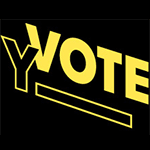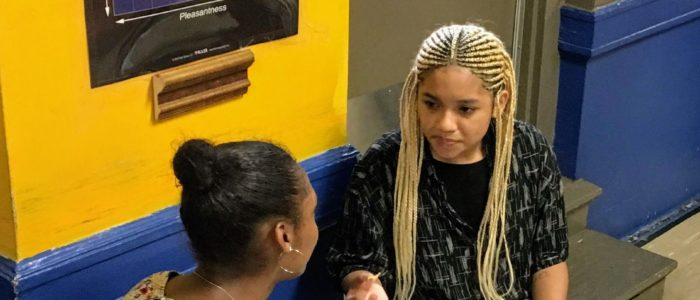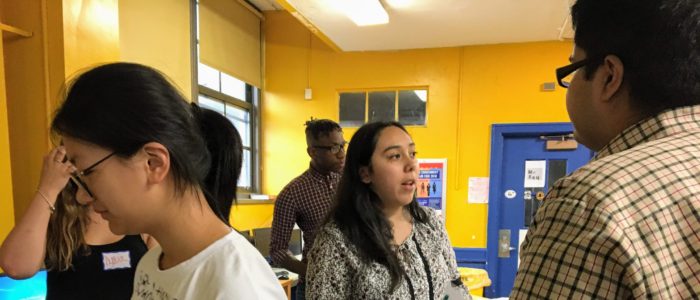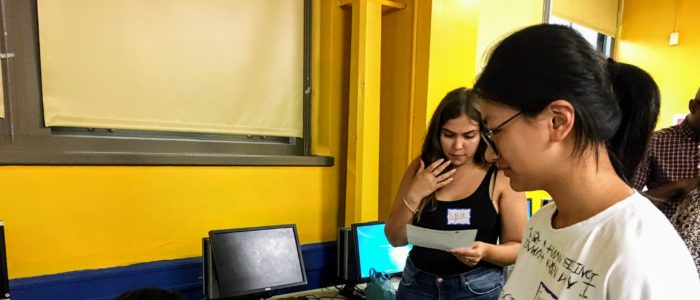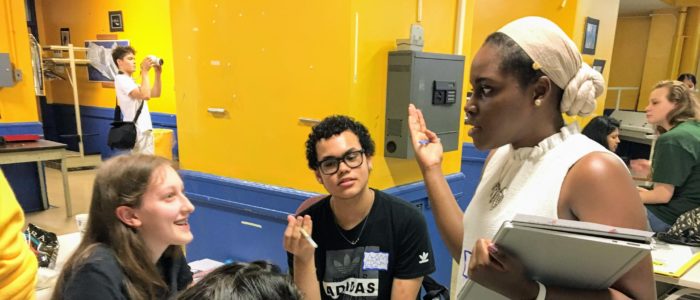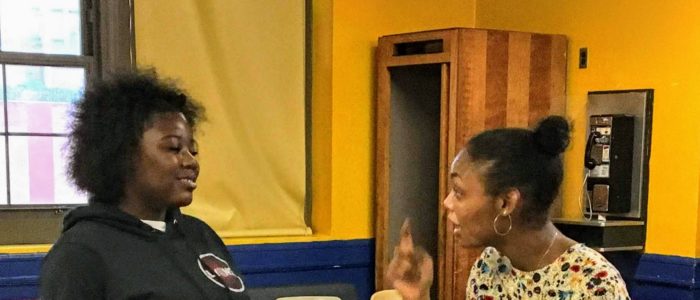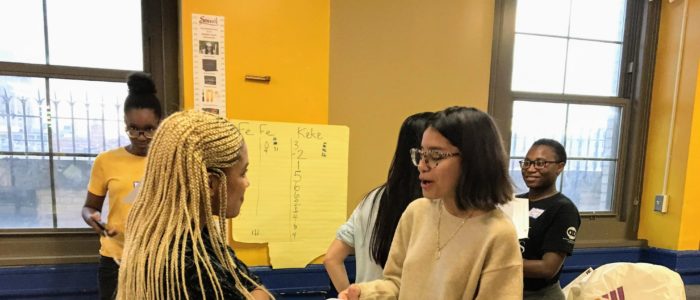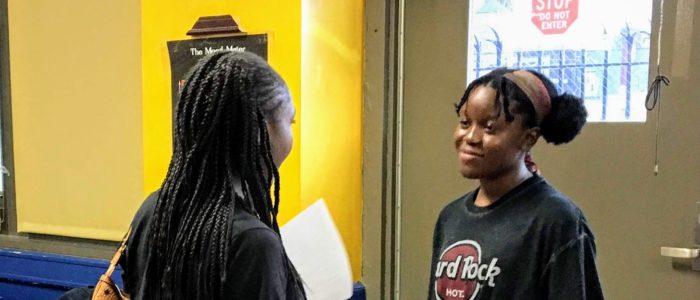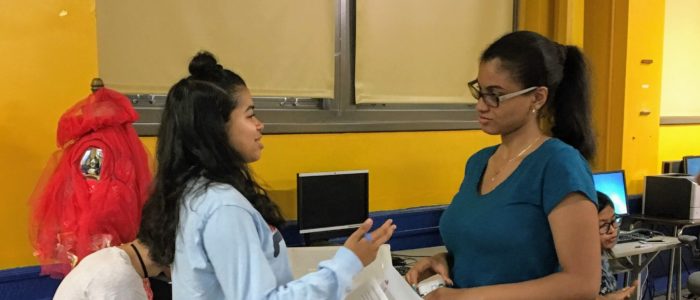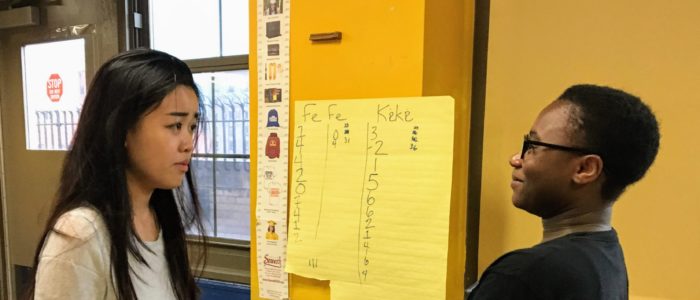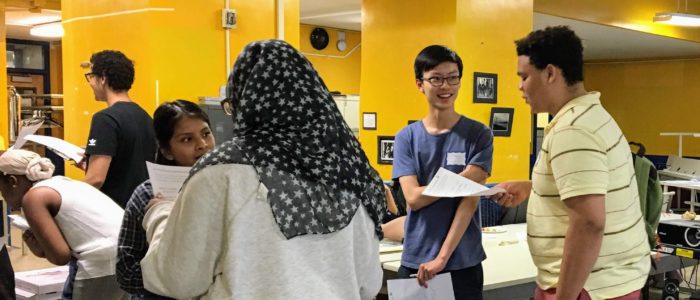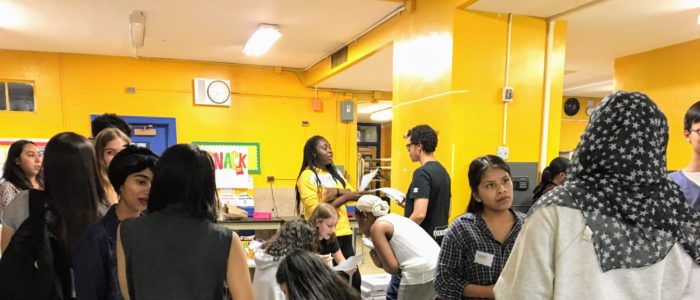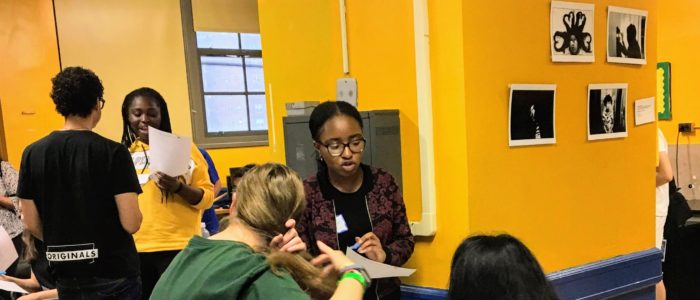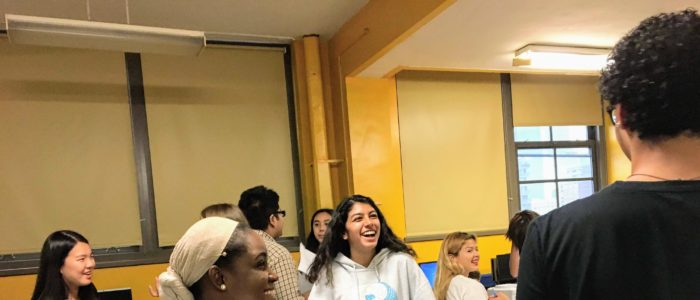Summer Pizza and Politics Forums 2018
YVote was inspired by Freedom Summer 1964, a proud moment in the history of our country during which over 1000 college students were literally willing to put their lives on the line for a cause they believed in. That cause was voting, which they perceived as a vital vehicle for social change (along with increasing literacy and expanding opportunities of all sorts.) Recognizing that just 50 years later, in the 2014 midterms, a mere 14% of 18 and 19 year olds deemed voting worth turning out to vote made us ask ourselves “why vote”–and made us want to create an inquiry-based program for teens that would engage them with this vital question. At YVote, we do that through exploration of issues young people care passionately about–things like gender justice, immigration, school equity, and violence and community transformation–through the lens of voting, the impact of electoral politics on us, and the impact of us on electoral politics.
We were proud to launch a second summer of YVote Pizza and Politics Forums in 2018, following a successful pilot in Summer 2017 and a year of Pizza and Politics Forums. One of the beauties of this summer is that we were able to utilize a dozen of the outstanding young leaders we worked with over the past year, who analyzed what worked and what could be improved for this summer and co-designed and co-facilitated our sessions.
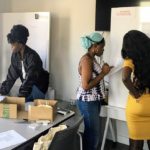
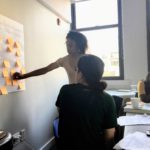
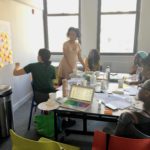
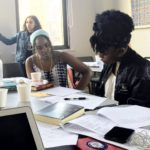
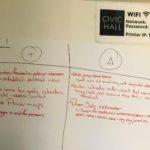
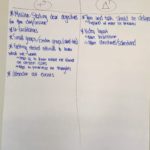
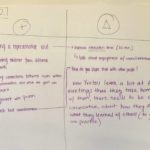
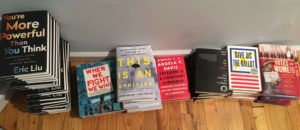
They also read a lot of political and civic books to prepare.
We are very grateful to Alissa, Chris-Ann, Destiny, Diavione, Divine, Faith, Katrice, Keyshawn, Nuzhat, Saskia, Shuma, and Yessii, as well as continuing adult facilitators extraordinaire Jade, Melody, and Sanda.
There was an outpouring of interest in YVote this summer, with more than double the applicants than we could accept. We selected 50 high potential youth from across 18 schools to participate in a biweekly series of Summer Forums, built upon a design thinking Framework of Discover (Empathy), Define, Dream (Ideate), and Develop (Prototype.) We were fortunate to again convene in the wonderful Community Hub of the CUNY Grad Center for our July Forums.
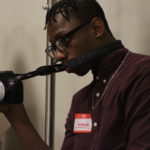
And we were fortunate to partner with #WeAreAll18 to utilize incredibly talented teen videographers from the High School of Art and Design to record much of the summer proceedings.
Forum 1: Discover
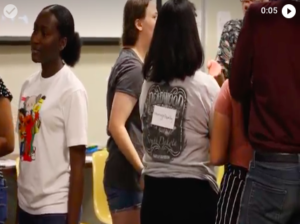
Just an hour after a mini-monsoon in Manhattan, the intrepid 2018 YVoters journeyed through rain and sleet and early night to gather at CUNY Grad Center. We launched with “We Got Issues,” in which students entered, chose a face-down index card with an issue written on it that was then taped to their back, and had to figure out just what issue they were by how fellow YVoters interacted with them. #SocialJusticeFun
We then gathered in a circle for an overview of YVote and what brought each of us to it. We were very inspired by the testimonials from youth leaders–and the new YVoters were as well.
Chris-Ann and Divine shared broader context about YVote partnerships and the movement that YVote is part of, as exemplified by the 22×20 campaign and video of the Teen Action Party we cohosted with them over the winter.
Nuzhat and Faith shared our 18 in ’18 One Million Voter campaign, and encouraged people to join our Motivote Pledge to Vote partnership–text “pledge” to 554-99 and you too can pledge, create a team of pledgers to mobilize people to register and turn out, and qualify for fabulous prizes.
Destiny and Diavione shared the powerful YVote Platform and Alissa and Saskia shared our YVote Community Agreements–vital to creating safe and courageous space.
We underscored that we will consistently use the theme of Y–the youth perspective and impact–and WHY–looking at why things are and aren’t the way they are, in order to understand HOW and WHAT we can do to make things better. We framed why VOTING is a powerful way of tackling myriad issues young people care about and are committed to. We referenced two focal components in increasing youth voting: registration and turnout. We explained why we want to get to root causes of youth motivation–and how we can change them. We underscored that although many of us have strong partisan beliefs, we are cross-partisan, honoring and learning from all political perspectives and beliefs. Our goal is not to change one another’s opinions but to increase one another’s understanding. We helped people feel comfortable in the space and with each other. Encourage them to sit with and speak with people they don’t know.
And with that, we launched into design thinking. What’s design thinking? It’s a form of solution-focused thinking with the intent of producing a constructive future result. Why is that important? Well, youth voter turnout has been a problem for decades. To make a dent, we need to come up with new strategies and solutions. And that’s where innovative YVoters come in! This is also referred to as human centered design bc it puts SPECIFIC HUMANS like us at the center, as opposed to theories or abstract ideas.
For Forum One, we started with the very important stages of empathy and definition–investigating what we know and what we want to know about voting, testing a few things out, honing in on issues we care passionately about and how they connect to voting, and beginning to develop action plans, starting with interviewing key stakeholders to learn more about what does and doesn’t motivate them.
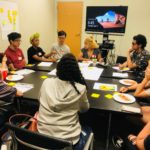
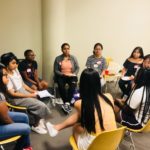
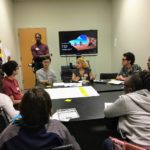
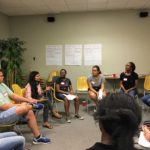
We divided into small groups, facilitated by our intrepid youth facilitators, each of which created three Flip Charts about What They Know and What They Want to Know about Basic Facts, Emotional/Social, and Logistical/Physical aspects of voting. They came up with great stuff–there’s A LOT we know and A LOT we still want to know about voting.
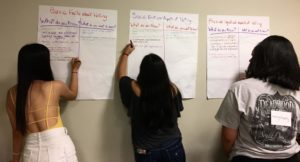
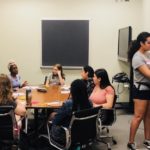
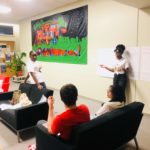
After this cerebral session, it was time to shake it up with some socializing–with strangers! Alissa gave a great overview of our Find a Stranger Session.
Invigorated (and perhaps still a BIT intimidated), YVoters descended down to Fifth Avenue and approached strangers (yes strangers) on the street to try to get them to engage with them. Afterwards, they asked the strangers why they agreed to do it and if they had any tips for getting others to engage. This stuff isn’t easy, and YVoters had to steel themselves up for the rejection of busy New Yorkers. But developing the skills and resilience to engage and involve people who might not otherwise get involved is vital. They did great–and had fun doing it (really)!
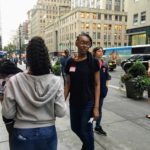
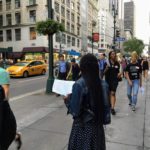
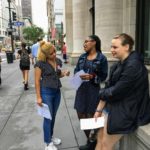
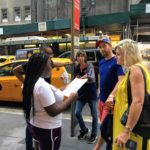
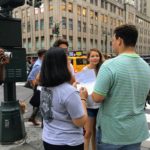
Afterwards, we had a brief dance break. After all, as Emma Goldman said, if there’s no dancing, it’s not my revolution!
We next divided into Affinity Groups based upon interests that YVoters expressed in their applications: Gender Justice, Immigration, School Equity, and Violence and Community Transformation. They started with a graphic brainstorm, with their topic in the middle and spokes leading to what issues or current events relate to the topic. They thought deeply about whether knowing more about their respective issues can make an impact on who votes and who gets elected. They committed to interviewing at least one peer about this issue and voting to inform their empathetic research process. And they VOTED on what topics they wanted to talk about next Forum.
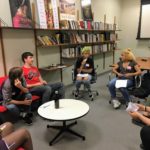
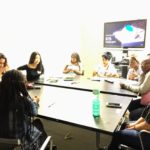
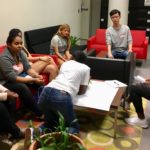
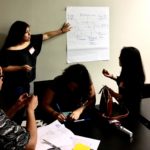
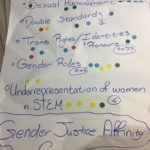
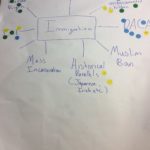
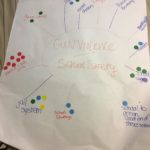
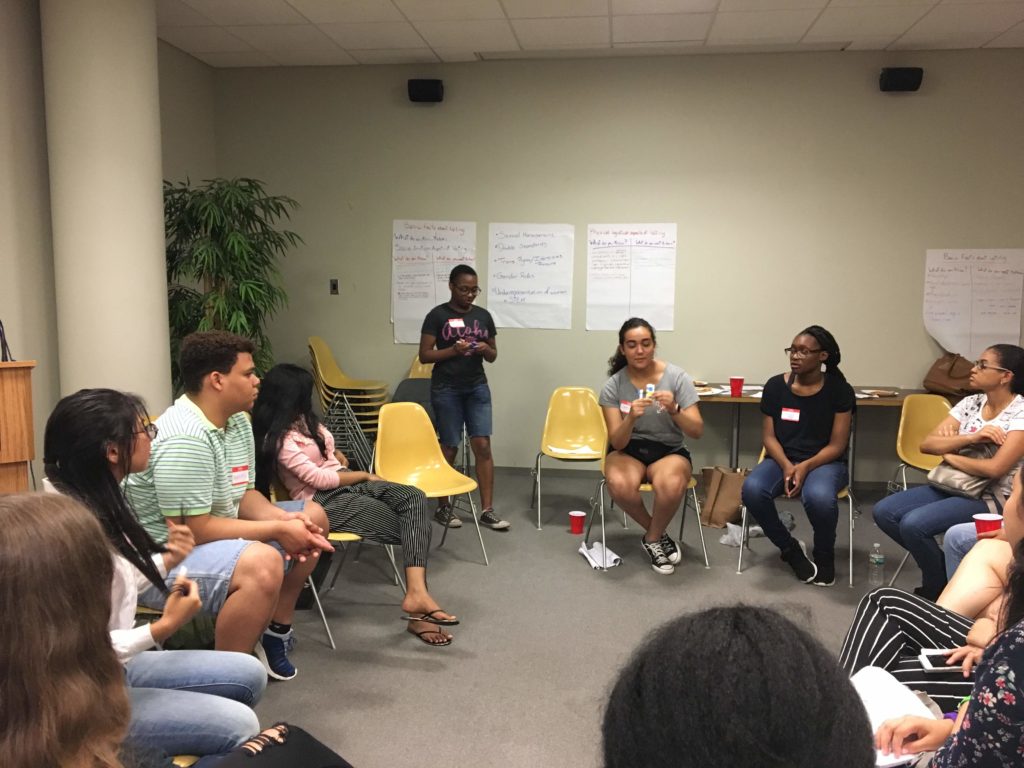
We end our YVote Forums with a closing ritual led by a student or students. We were fortunate to have Chris-Ann close out our first Forum with her powerful spoken word.
Forum Two: Define
The energy was high as we gathered for our second Forum.
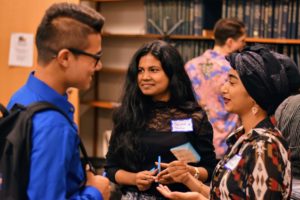
We started with a Current Events Carousel. As youth entered the room, they jotted down and discussed thoughts about current events on their mind, where they get their news, what kinds of conversations they have about political and civic issues they have with friends and families–and what it would take to dig deeper into these conversations.
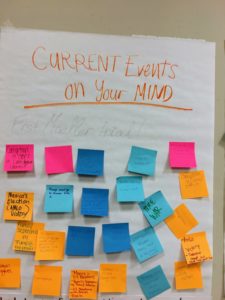
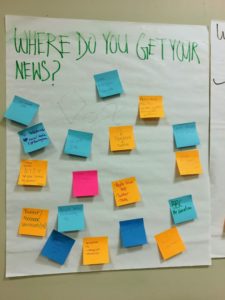

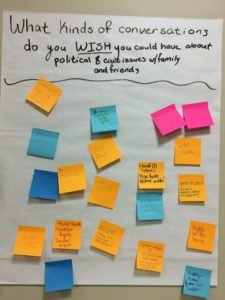
We broke into small groups building upon the What Do You Know/What Do You Want To Know session of Forum One to establish baseline facts about youth voting as well as to gain better understandings about what methodologies do and don’t work in engaging–and turning out–young people.
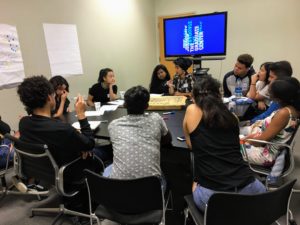
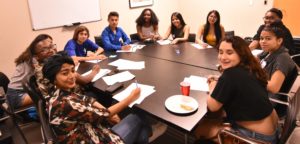
Lots of incisive reflections were shared about the power and potential of voting.
And about what it will take to motivate voters–and the role of social media in doing so.
So next up: power mapping. It’s vital for young people to understand how power flows, who has power, and how it gets used (and misused. and unused) in relation to the issues we care most about. Melody explained the exercise, well, powerfully:
as did Saskia and Katrice:

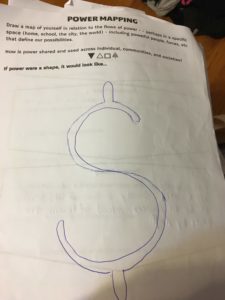

Opinions ranged widely, about whether power is negative or positive:
And of course about the role of money in relation to power:
Needless to say we talked about the implications of this for voting. We also discussed how we can make these connections more explicit and transparent to other youth.
Yessii provided some power-full framing, based upon some of her favorite sections from Eric Liu’s “You’re More Powerful Than You Think: A Citizen’s Guide To Making Change Happen,” which YVoters all received.
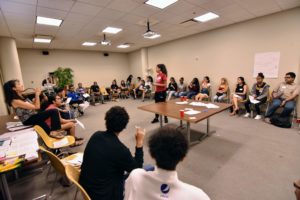 After a super fun Mid-Session Action of Go Stop that surfaced powerful reflections about human behavior, what does and doesn’t influence it, and how we can draw upon these insights in our youth organizing work, we branched into “For the People, By the People” to further increase understanding of what people care about and how it motivates behavior. We broke back into the four Affinity Groups we launched last session–Gender Justice, Immigration, School Equity, and Violence and Community Transformation–to hone in on an Opportunity Area to work towards understanding better and addressing more effectively. We learned about Empathy Interviews–a key part of Phase One of the Design Thinking Process. YVoters shared highlights and key learnings about people’s perceptions of voting gleaned through interviews over the two weeks between Forums.
After a super fun Mid-Session Action of Go Stop that surfaced powerful reflections about human behavior, what does and doesn’t influence it, and how we can draw upon these insights in our youth organizing work, we branched into “For the People, By the People” to further increase understanding of what people care about and how it motivates behavior. We broke back into the four Affinity Groups we launched last session–Gender Justice, Immigration, School Equity, and Violence and Community Transformation–to hone in on an Opportunity Area to work towards understanding better and addressing more effectively. We learned about Empathy Interviews–a key part of Phase One of the Design Thinking Process. YVoters shared highlights and key learnings about people’s perceptions of voting gleaned through interviews over the two weeks between Forums.
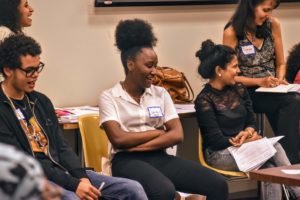
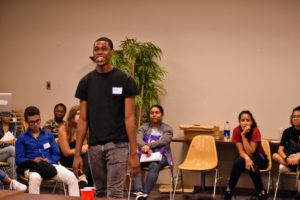
From that, each group moved into determining WHAT they want/need to research by creating a problem statement that they might want to solve. Things like, “How can we improve our civic system in NYC in a manner that would improve the lives of immigrants, documented or undocumented?” and “How does sexual assault and sexual harassment impact young people and people of color–populations not as prominently featured in #MeToo coverage.
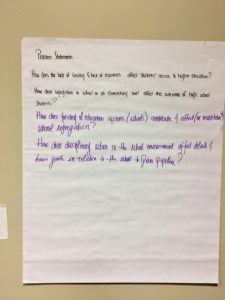
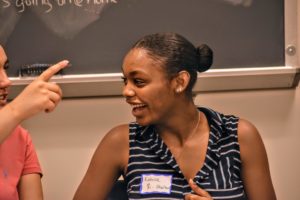
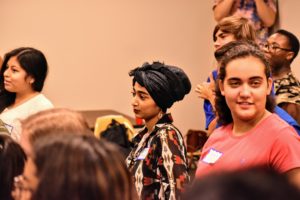
Each group started to draft a research plan for tackling questions like:
-
-
- What are the current outcomes and consequences of the problem we want to address?
-
- What are the systems that produce the current outcomes?
- Who do we want to talk to?
- What questions will we ask?
- How will we account for biases in what people do and don’t tell us?
- What analogous research can we do to learn from related examples? (i.e. how can we get people to be as motivated to vote in local elections as vote for their favorite candidate on “America’s Got Talent…”)
- Where will we go to conduct our research?
- How will we document our findings?
-
Groups made good starts and came up with solid next steps.
We closed with Key(shawn) on the key(board) playing (Alicia) Keyes.
Moving way to end the evening!
Forum Three: Dream
Our third Forum had us branching out to a new location: the 8th Floor of the High School of Fashion Industries (HSFI.) It gave us a fresh perspective on things, which is always useful.
We started with POWER Bingo, learning more about one another’s activism experience and interests.
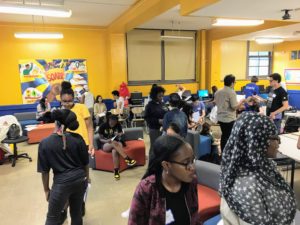
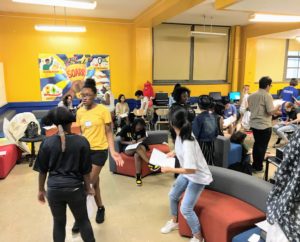
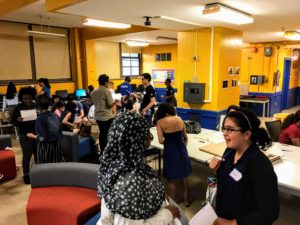
Next, we split into small groups to read some articles about what is and isn’t promising around youth voting nationally and to hone in on where we can interact with young people this fall to have significant impact. We analyzed “youth voter hotspots” through CIRCLE’s Youth Electoral Significance Index (YESI) which utilizes indicators of demographics, historical voting patterns, and projected competitiveness to produce a ranking of the states and districts where young people (ages 18-29) have the highest potential for impact on the 2018 elections.
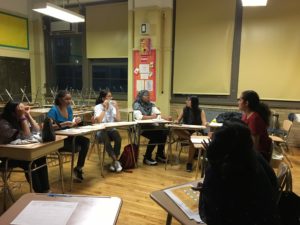
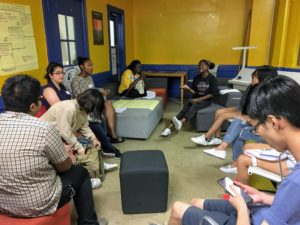
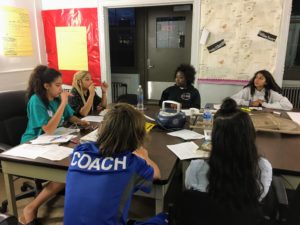
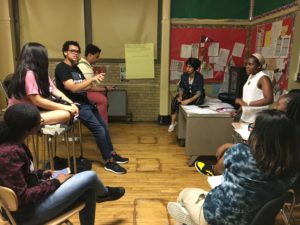
We then reconvened into our Affinity Groups to share key learnings from our readings and analysis, along with individual work from the last two weeks, and to reflect upon collective implications, contemplating
-
- What did we learn from this research that has implications for our work?
-
- What’s missing that we want to add to the narrative?
- What elements do we want to add to our research template?
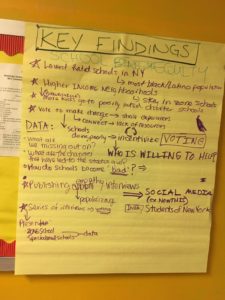
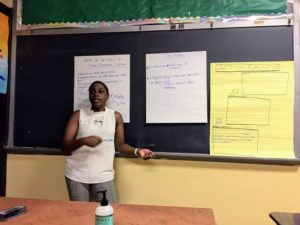
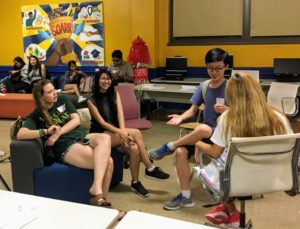
This was in preparation to work on presentations to share with elected officials and civic movers and shakers at our final Forum of the summer. We underscored that these will be presentations of work very much in progress, with the hope of getting formative assessment from civic experts who can help hone our focus and ensure that work this fall is directed in ways that will make the biggest positive impact. Affinity groups were encouraged to share:
-
- Key learnings to date
-
- Why it matters
-
- Implications for youth and youth voters
-
- What other perspectives there might be about this issue
- How you intend to continue working on it during the fall
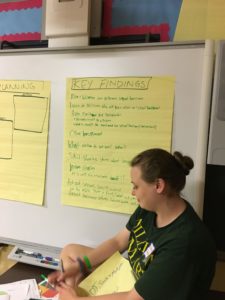
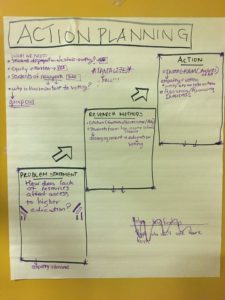
Soon it was time for our Mid-Session Action: a Mocktail Party. Yes, at YVote we know how important networking is and we work to ensure that we’re equipped to do it as effectively as possible. Melody provided a mini-lesson on giving a good pitch–about YVote and about ourselves–and YVoters practiced the pitches on one another, getting feedback and building connections. Oh, and having fun.
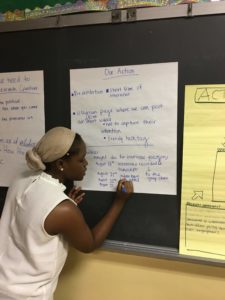
Back to work, on what we called “Rise and Shine” as Affinity Groups buckled down to prepare creative, compelling presentations– for external guests on Aug 28 and for sharing with peers at schools and in communities thereafter. They honed in on what they want to present, how they want to present it, and what work they need to do between now and Aug 28 to knock it out of the park.
Our closing ritual was a stirring rendition of “Isn’t She Lovely?”–which we re-cast as “Isn’t Voting Lovely?” performed by our multi-talented #WeAreAll18 videographers Dekko and Jeremiah.
(Oh, and then we had an after party (with a special 18 in ’18 cake) for our AMAZING youth facilitators, many of whom are going off to college before our last session. You will be missed–and will ALWAYS be an indelible part of YVote!
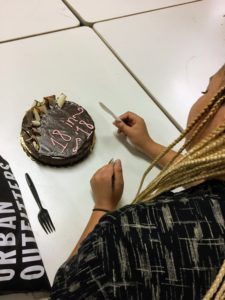 Forum Four: Develop
Forum Four: Develop
There was a thrum of excitement in the HSFI Community Hub as we launched our final session of the summer, knowing that a dozen top notch civic leaders would be joining us an hour in.
But first, as always, we Reconnect and Reflect, this time with Concentric Circle Conversations, boogieing with one another and engaging in rotating conversation pairs, sharing responses to things like:
- What was the highlight of your summer (beyond YVote :)?
- What current issue in politics is haunting you most?
- What do you think is the biggest barrier to youth voting?
- Where would you most like to see YVote head this fall–and beyond?
- What skill would you most like to work on this fall?
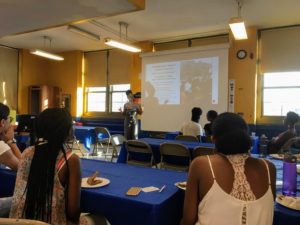
Warmed up and reconnected, we gathered to listen to Jade share a “case study” of her recent activism leading the #NoRespectNoBusiness and #BuyBlack Flatbush campaign stemming from an egregious act of racial injustice at the New Red Apple nail salon in crown heights. She spoke about how to get everyone aligned in organizing, effective communication strategies, coming to consensus around next steps and how to have impact, figuring out who has power and how to influence them, distinction between legislative power and influential power. She underscored implications from the successful campaign for (youth) voter and civic engagement, looking at bills being teed up, organizations, and special interest groups.
YVoters split back into their Affinity Groups to put final touches on their presentations and to run throughs prior to the arrival of our Issue Experts and respondents.

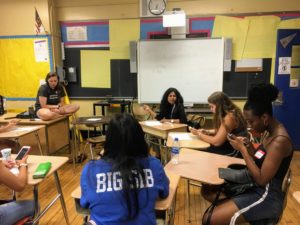
We were gratified to be joined by an illustrious and generous group of change makers, including
-
- Steven Pacheco from John Jay College of Criminal Justice
-
- Sherry Hakimi from GenEquality
-
- Joe Rogers and Paloma Garcia from the Center for Educational Equity/Democracy Ready Coalition
-
- Taylor McGraw from Teens Take Charge
-
- Sarah Zapiler from IntegrateNYC
-
- Rachel Konowitz from Motivote
-
- Chi-Ante Singletary from the Youth Engagement Fund
Respondents were asked to be particularly attuned to the following in the presentations:
-
- Why does this issue matter—to you and to other youth?
-
- What strategies will your group employ to encourage young (prospective) voters to support this issue?
-
- What resources are needed to get young people to take action around this issue?
- How will this project lead to influencing (mobilizing) your community? Policy? City, state, and national politics?
And with that, the presentations began. We were BLOWN AWAY by the quality (and creativity) of the work every single one of the Affinity Groups produced in such a relatively short amount of working time. While the work is still in its early stages, it demonstrates tremendous potential.

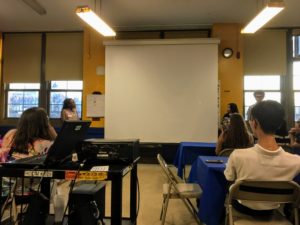
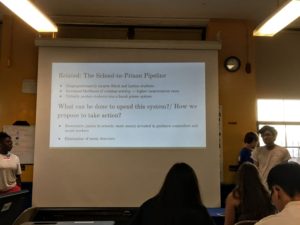
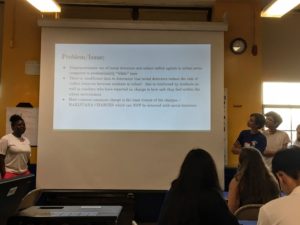
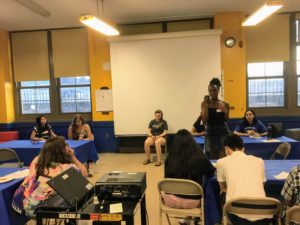
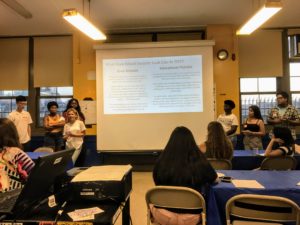
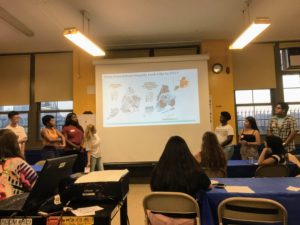
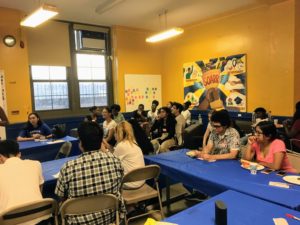
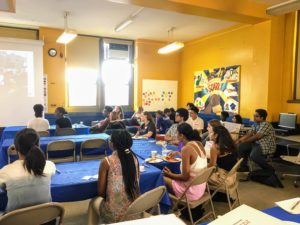
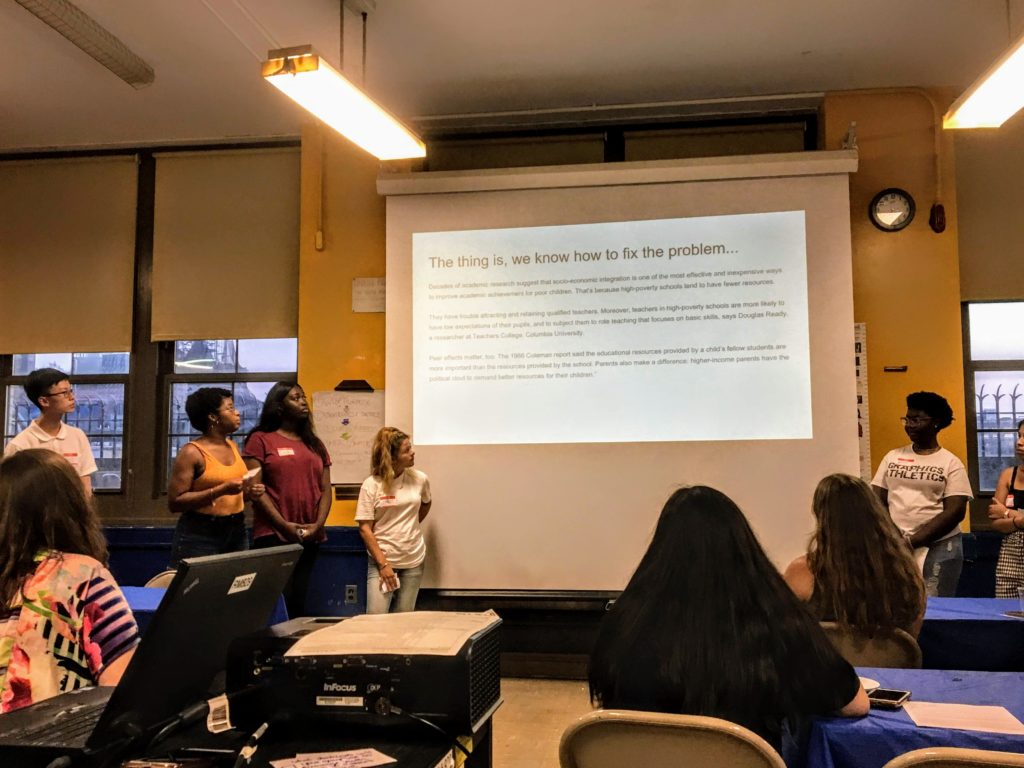
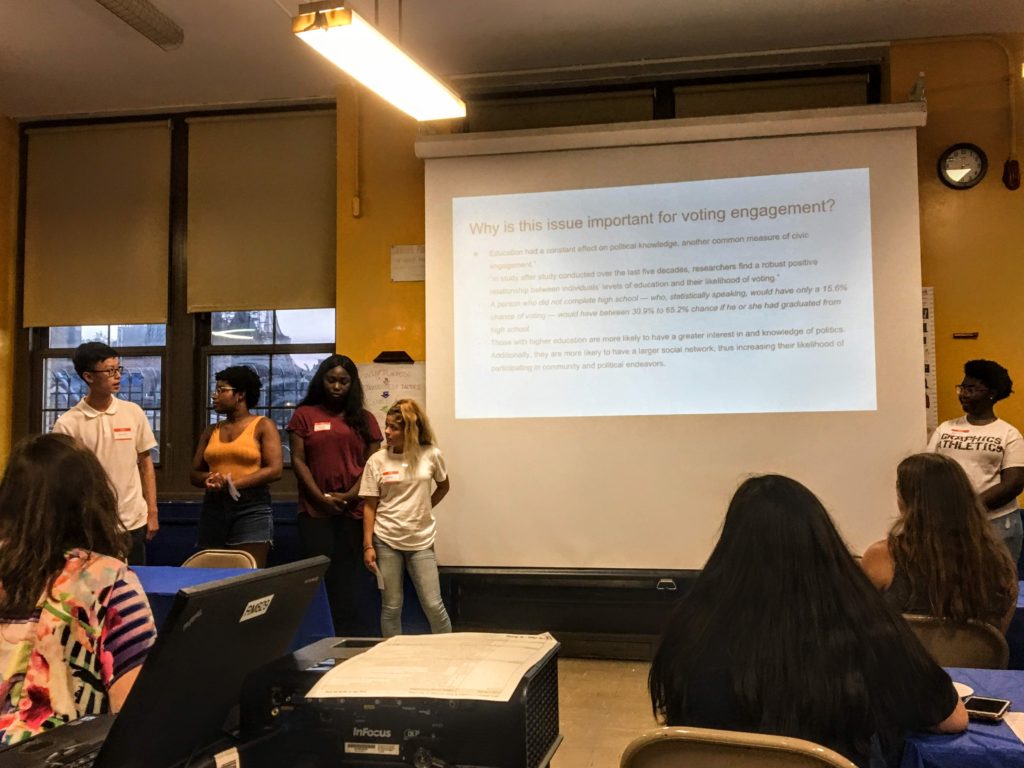
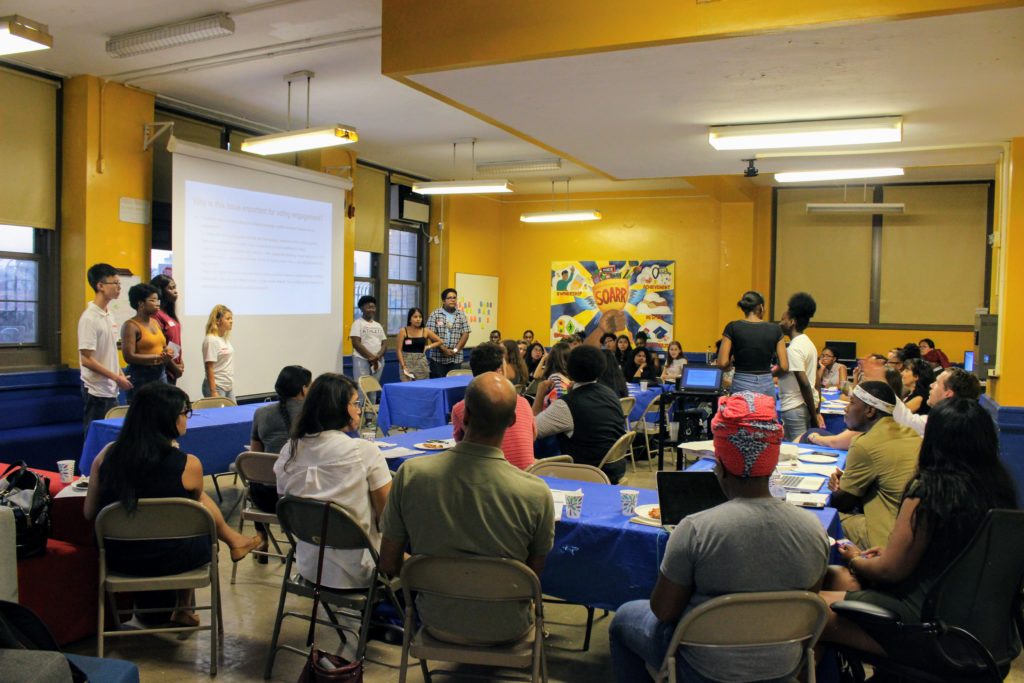
In addition to raising questions and providing specific feedback to each group, we closed the presentation portion of the evening with issue experts provided overarching feedback based on experiences and insights, sharing:
-
- key lessons learned as an organizer and advocate
-
- ways they’ve built empowerment in their communities
- who and what have been their biggest allies and their biggest obstacles
The energy in the room was electric as Affinity Groups re-assembled to discuss the feedback they received and 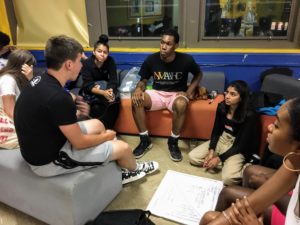 formulate next steps. After some time discussing and processing what they heard and implications for the work of their specific group and YVote at large, YVoters each reflected on ways they want to stay involved and connected, to YVote and to youth civic engagement more broadly and made specific commitments.
formulate next steps. After some time discussing and processing what they heard and implications for the work of their specific group and YVote at large, YVoters each reflected on ways they want to stay involved and connected, to YVote and to youth civic engagement more broadly and made specific commitments.
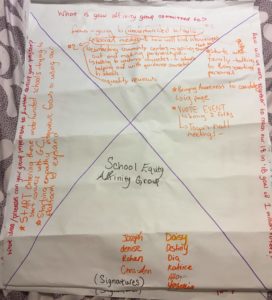

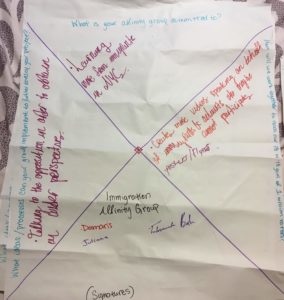
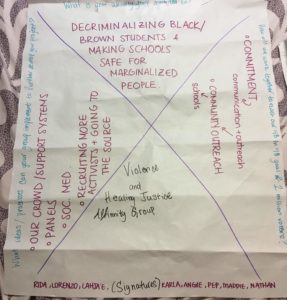
Our final Closing Ritual was perhaps our most powerful yet. We stood in a giant circle and Passed the Praise, providing a specific affirmation to the person standing to our left. We had tingles reflecting on how much each and every participant contributed to the community and to our collective work. Many challenges and opportunities lie ahead in our 18 in ’18 quest to ensure an unprecedented number of 18 year olds vote on November 6, but with young people like ours leading the way, the impossible is becoming increasingly more possible.
